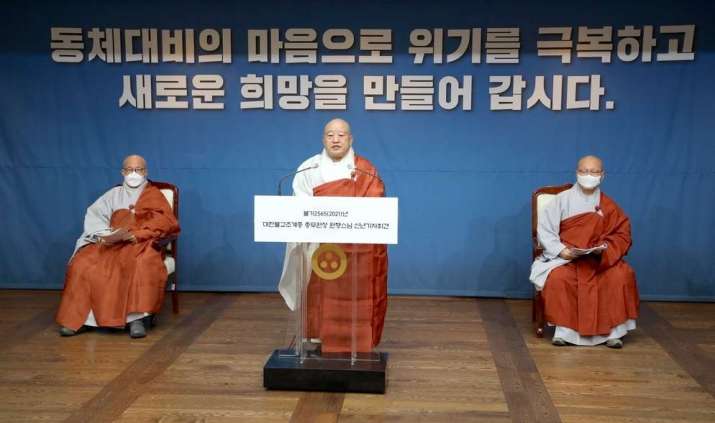NEWS
Senior Buddhist Monk Pledges COVID-19 Aid for North Korea, Vows to Fight Discrimination
The president of the Jogye Order of Korean Buddhism said yesterday that South Korea’s largest Buddhist order would offer relief supplies and assistance for North Korea to tackle the COVID-19 pandemic, while also pledging to combat discrimination in South Korean society.
“We will push for inter-Korean exchanges in Buddhism by closely working with the Korea Buddhist Federation of the North,” Venerable Wonhaeng told reporters during an online press briefing on Tuesday. “I’ll seek ways to promote peace and co-prosperity on the Korean Peninsula.” (The Korea Times, Yonhap News Agency)
The Jogye Order is a school of Seon (Zen) Buddhism that traces its roots back some 1,200 years to the Unified Silla (also known as the Later Silla) kingdom (668–935). The Jogye school as a distinct entity emerged in the late 11th century when the monk Bojo Jinul, credited as the school’s founder, sought to combine Seon practices with the theological underpinnings of sutra-based Buddhist schools, including Korean Pure Land Buddhism. The order now represents the largest segment of South Korea’s Buddhist population, administering about 1,900 active temples, more than 13,000 monastics, and seven million lay followers nationwide.
 Ven. Wonhaeng speaks at an online a press conference on Tuesday. From koreaherald.com
Ven. Wonhaeng speaks at an online a press conference on Tuesday. From koreaherald.comVen. Wonhaeng said the Jogye Order would send protective equipment and relief supplies to help North Korea tackle the pandemic, while also working toward the resumption of joint projects and cross-border activities in 2021. Ven. Wonhaeng, the 36th president of the Jogye order, was elected to office for a four-year term in 2018, in the wake of a series of scandals involving the order’s leadership.*
A number of cross-border initiatives have been halted or suspended in recent years as relations between the two governments have grown strained. Among them, plans for the restoration of temples destroyed during the 1950–53 Korean War; joint religious services at Singye-sa, a Buddhist Temple in North Korea’s Kangwon Province; and the release of a joint prayer statement each year on the birth anniversary of the Buddha.
North Korea, one of the world’s most isolated countries, has repeatedly asserted since the beginning of the pandemic that it has recorded no cases of COVID-19. In 2020, the World Health Organisation said the country had identified at least 8,000 suspected infections but none had tested positive. Media reports earlier in January, citing sources in Pyongyang, said there had been a spike in infections there following public New Year celebrations that were attended by thousands of people.
Ven. Wonhaeng also joined the Christian National Council of Churches in Korea (NCCK) on Tuesday in pledging to push for new legislation to tackle discrimination against minority groups in Korean society.
“Discrimination against those with disabilities, or by region, race, language, and religion, still occurs in our society,” Ven. Wonhaeng emphasized. “There is a need for the legislation of the anti-discrimination law, but it has been repeatedly postponed. The order will hold prayer meetings for its legislation, show solidarity with other groups, and negotiate with the government.” (The Korea Times)
Ven. Wonhaeng lauded the cooperation of the Buddhist community in South Korea in efforts to minimize the spread of COVID-19 over past 12 months. “[The] Jogye Order has issued multiple orders to close temples, halt services, and cancel Yeondeunghoe [연등회; the Lotus Lantern Festival, traditionally held in the spring to celebrate the birth of the Buddha] in a way to share the pains with our neighbors,” he noted. (The Korea Herald)
At the time of writing on 20 January, the Korean government—which was one of the fastest in the world in its early response to contain the local spread of the virus in 2020—had recorded 73,518 confirmed cases of COVID-19 and 1,300 deaths, with 60,180 people reported to have recovered.***
According to census data for 2015, the majority of South Korea’s population—56.1 per cent—holds no religious affiliation. Christians make up the largest religious segment of the population at 27.6 per cent, while Buddhists account for 15.5 per cent. While official statistics for North Korea are not known, the Washington, DC-based Pew Research Center estimates that 71 per cent of North Koreans have no religious affiliation, with “other” religions accounting for 12.9 per cent, folk religions 12.3 per cent, Christianity 2 per cent, and Buddhism 1.5 per cent.
* Jogye Order of Korean Buddhism Elects New Head Monk (Buddhistdoor Global)
** Korean Buddhists Cancel Lotus Lantern Festival as Pandemic Caution Lingers and UNESCO Lists Korea’s Buddhist Lantern Festival as Intangible Cultural Heritage of Humanity (Buddhistdoor Global)
See more
S. Korea's Buddhist leader vows to seek inter-Korean exchanges through COVID-19 relief (Yonhap News Agency)
S. Korea's Buddhist leader vows to seek inter-Korean exchanges through COVID-19 relief (The Korea Herald)
Religious leaders vow to seek inter-Korean religious exchanges, tackle discrimination (The Korea Times)
Related news from Buddhistdoor Global
President Moon Calls on Buddhist Support for Korean Reunification Hopes
Head of the Jogye Order of Korean Buddhism Blames Greed, Avarice for COVID-19 Pandemic
South Korea’s Buddhist Jogye Order Responds to Coronavirus Outbreak
South Korean Buddhist Order Proposes Temple Stay Program in North Korea
Buddhist Monk from South Korea Ventures North to Foster Bilateral Ties
Related features from Buddhistdoor Global
Engaged Buddhism: Seon Master Pomnyun Sunim Pledges 10,000 Tons of Food Aid for Children in North Korea
My Journey on the Path of Won Buddhism
Seon and the City














